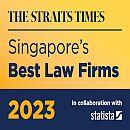Litigation and Dispute Management Partner S Suressh was quoted in The Straits Times article titled "CCCS's anti- competitive ruling on Grab- Uber merger fair: lawyers"
Eversheds Harry Elias Litigation and Dispute Management Partner S Suressh was quoted in The Business Times article titled "CCCS's anti- competitive ruling on Grab- Uber merger fair: lawyers". The article was first published on 03 Aug 2018.
CCCS's anti-competitive ruling on Grab-Uber merger fair: lawyers
They say deal has led to substantial reduction in competition and high entry barriers for new players
Contrary to Grab's view, the ruling by the Competition and Consumer Commission of Singapore (CCCS) that its takeover of Uber's South-east Asian business threatens competition is fair, lawyers told The Business Times. It is CCCS's role to ensure a level playing field so that consumers don't get held to ransom by monopolies or near monopolies, they said.
Their comments follow Grab's written response to CCCS last week explaining why it disagrees with the Commission's decision that the Grab-Uber merger has led to a "substantial lessening of competition" in the ridehailing sector. The comments also come after GGV Capital - an early investor of Grab - proclaimed that such a decision could hurt innovation and limit investor interest in Singapore and South-east Asia.
Stefanie Yuen-Thio, joint managing partner of TSMP Law Corporation, told BT that CCCS's job is to ensure the barriers to entry are not so high that other players cannot enter the market and offer consumers an alternative choice. "CCCS has been accused of not being pro-business, but it does not help to promote innovation if other ridehailing providers cannot easily operate in Singapore."
She added that while it is every corporation's mission to beat the competition and build a monopoly - such as by using subsidies to seize market share - it is the competition watchdog's role to ensure "some equality" in the playing field so that consumers "do not get held to ransom by monopolies or near monopolies".
S Suressh, a partner at Eversheds Harry Elias's litigation practice group, said that CCCS has reasons to rule the Grab-Uber merger as having led to a "substantial lessening of competition". He noted that while the said phrase has not been clearly defined, CCCS has provided a general guideline that competition concerns are unlikely to arise unless in the event of two scenarios:
1. The merged entity has or will have a market share of 40 per cent or more; or
2. The merged entity has or will have a market share of between 20 to 40 per cent, and the post-merger market share of the three largest firms is 70 per cent or more.
Mr Suressh said: "With traditional taxi-booking services (found by CCCS to be) constituting less than 15 per cent market share in Singapore, coupled with the finding that Grab and Uber were the two closest prevailing competitors in the ridehailing platform services market, CCCS has now decided that Grab and Uber's merger raises serious competition concerns."
When asked if CCCS' proposed measures to address a potential monopoly in the ridehailing sector would lead to "unnatural competition" as asserted by GGV Capital, he said: "It is not sensible to talk about 'unnatural competition' when what you have in effect is a virtual monopoly. The measures are designed to maintain competitiveness in the market that will otherwise not exist." He told BT that in assessing the effect of CCCS's measures, one must consider the problem that it is trying to address. That is, by virtue of the merger and the exit of Uber from the market, the main competitor to Grab has left the ridehailing market, "resulting in an anti-competitive market".
Mr Suressh added that the entry barriers for new players are high, in part due to the "network advantage" that Grab has. CCCS's proposal that Grab removes its exclusivity obligations and lock-in periods for drivers is meant to address those barriers and to encourage new players to enter the market, he said.
"It should be noted that the measures proposed by CCCS have not been finalised and are subject to public feedback, including from Grab itself before they are finalised."
The partner at Eversheds Harry Elias also shared that Singapore has a voluntary notification regime that allows parties in a potential merger to notify CCCS of their proposed merger so that it can either clear the merger for not having any competition concerns, or propose conditions to address the competition concerns, if any. "This is the first case that CCCS has investigated a merger that was not previously notified to them, and found it to be anti-competitive."
TSMP's Ms Yuen-Thio said: "It's heartening to note that other ridehailing operators are now actively looking to enter the market, giving harried commuters options."
New ridehailing player Ryde, for instance, said on Thursday that it has obtained the certificate for Class 1 third-party taxi-booking service from the Land Transport Authority. This lets it work with taxi operators to dynamically fix fares for taxis through the Ryde app - as opposed to having its riders book taxis via the Ryde app and be charged by the meter - and increase its private-hire fleet.
Meanwhile, Grab said on Thursday that it has raised US$2 billion in its latest financing round. This includes the US$1-billion investment from Toyota that Grab had announced in June. New investors include Ping An Capital, OppenheimerFunds, Mirae Asset-Naver Asia Growth Fund, Cinda Sino-Rock Investment Management Company, All-Stars Investment, Vulcan Capital, Lightspeed Venture Partners and Macquarie Capital.
Grab said it would use the funds to expand its range of O2O (online to offline) services in South-east Asia, and to grow into the "everyday super app" of choice for millions in the region. In particular, Grab will use a significant portion of the new capital to continue investing in Indonesia, which is where more than half of its 7.1 million micro-entrepreneurs on its platform reside.
Author: Jacquelyn Cheok, The Business Times
For more information, please contact our Business Development Manager, Ricky Soetikno at rickysoetikno@eversheds-harryelias.com













